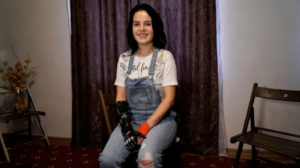
In December 2017, Margarita Gracheva’s husband brutally attacked her. She has since emerged as one of the most high-profile victims of Russia’s epidemic of domestic violence. (Pascal Dumont/CBC)
Warning: This story contains graphic details
By Chris Brown, CBC News, February 25, 2020
https://www.cbc.ca/news/world/russia-domestic-violence-1.5437241
Given the savagery of what Margarita Gracheva’s husband did to her, you’d think Russian lawmakers would want to stop it from happening to other women.
Instead, attitudes toward legislating tougher laws on domestic violence remain stuck in another century.
Two years ago, Gracheva’s husband cut off both of her hands, leaving the 27-year-old mother of two mutilated for life.
“I still have pain. It hurts and aches, but you get used to it,” Gracheva told CBC News in her St. Petersburg home, flexing the fingers on her artificial hand, which is attached to her right arm at the wrist.
The black fingers and silver joints give the German-made device an almost skeletal look, but it is dexterous enough for Gracheva to grasp small objects — after some practice.
Her left hand, meanwhile, is wrapped in a bandage and also clearly far from normal, visibly scarred and only partially functioning. But at least it allows her to once again feel her children’s skin.
“I still have a problem [combing] hair,” she said. “But really, happiness is in the little things.”
Gracheva has emerged as one of the most high-profile victims of Russia’s epidemic of domestic violence, and has given a powerful voice to the frustrations felt by women’s advocates who have tried for years to get stronger domestic violence legislation passed.
“There is no law now — nothing exists,” Gracheva said. “There is only help if there are beatings or a dead body. I don’t know how many more tragic cases have to happen for that to change.”
Sadistic attack
As Gracheva recounted her story, she acknowledged that “even now, when I read about it, my tears well up.”
She and her husband, Dmitry, met more than a decade ago, when she was still a teenager. A couple of years ago, they started having difficulties in their marriage, and she claims he was paranoid that she was having an affair.
In October 2017, she told him she wanted a divorce, and shortly afterward he moved out, although they continued to jointly parent their two boys, then aged three and five.
On the morning of Dec. 11, 2017, Gracheva needed a ride to get the children to daycare. It was the moment Dmitry had been waiting for to execute a sickening plan.
In his court testimony, he explained that he had scouted out a wooded area near their home. And he bought an axe.
Dmitry recounted how he picked Gracheva up in his car, overpowered her, tied her up and blindfolded her.
Then, Dmitry attacked her with the axe, over and over again, delivering 40 blows. First, he sliced into one of her legs. Then, he cut off one hand, followed by the other.
“She was crying and asking, ‘What are you doing? Why are you doing this?'” he said in his testimony.
Leaving parts of Gracheva’s severed and pulverized hands on the ground sticking out of the snow, Dmitry carried her to the car and took her to the hospital.
Police returned to the forest and recovered what they could, but surgeons were only able to re-attach one hand. Even that might not have been possible were it not for the fact that the snow had kept the bones and flesh cold.
Photos of the procedure — too gruesome for CBC to publish — show horrible scars where surgeons sewed Gracheva’s small hand back together in three pieces, and then reattached it to her arm.

Gracheva in hospital, putting on a brave face in the days after the December 2017 attack. (Submitted by Margarita Gracheva)
During his sentencing, where he received 14 years in prison, Dmitry told the court, “I’m not trying to justify what I did.”
“But when I realized I had no more family, I felt like there was nothing left to live for.”
Indifferent authorities
Gracheva said while she knew her husband could get angry on occasion, the ferocity of the attack was unexpected. “There was love — and then he changed in seconds and became a sadist and a maniac.”
But it wasn’t the first time he had threatened her. A month before, Dmitry had confronted her over his suspicions of infidelity. She claims he threatened her with a knife, although he denies it.
Gracheva said she reported the incident to the police but was met with indifference. “They spoke with him after, but not something serious — like friends talking at a building entrance, not as police officers and a criminal.”
On Dec. 7, 2017, her complaint against her husband was closed. The axe attack happened four days later.
“There is not any prevention of domestic violence in Russia,” said Alena Popova, a lawyer who for the past six years has led a push to strengthen Russian law.
She said restraining orders for threatening behaviour, intimidation and verbal threats do not exist. The only time authorities can legally act is if a woman actually suffers severe physical harm, at which point police can lay a criminal charge. Even then, Popova said, the bar to criminally punish an abusive spouse is high.
Abuse ‘epidemic’
Popova said that in 2017 Russia made the penalty for assaulting a spouse roughly the same as for a traffic infraction.

Lawyer Alena Popova has been pushing for stronger domestic violence laws in Russia for six years. ‘Its an epidemic,’ she said. (Pascal Dumont/CBC)
“If you have the wrong parking [spot] in Moscow, you pay 5,000 rubles [$100 Cdn]. If you beat anyone inside your flat, it’s 5,000 rubles,” said Popova.
“If you beat anyone inside your family, you just pay a fee. And the signal which our government sends to the perpetrators is that it’s O.K., you can just pay a fee.”
Popova said that according to the country’s official statistics agency, Rosstat, 16 million Russian women each year — roughly one in five — report some form of abuse from a domestic partner.
“It’s an epidemic in Russia,” Popova said.
For a brief time in 2019, Popova had hope that things might change. A series of shocking cases, including Gracheva’s, prompted Russia’s state media to give the issue far more prominence than usual.
Crucially, Oxhana Pushkina, a member of the ruling United Russia party, agreed to co-sponsor Popova’s legislation, which would have, for the first time, given domestic violence special status in Russian law. It would have finally empowered police to issue restraining orders against abusive spouses.
But when the legislation was tabled in the Duma, or parliament, in December, Popova was shocked to discover it had been dramatically altered. The key provisions on restraining orders, for example, had been eliminated.
“It’s like the castration of a law,” she said.
The draft is now being studied by a parliamentary committee, so there’s a chance it could be strengthened, but advocates aren’t hopeful.
‘Law castrated’
The domestic violence law may be another casualty of Russia’s ideological battle with the West. Popova said opponents often portray such social initiatives as caving into “liberal” or “western” thinking.
“The situation in our country is crazy. We have two different points of view — that violence should be prohibited and that violence is our traditional value,” she said. “‘Yes, I can beat my kids, but I am the father, and I can do that, because I have authority as a parent.”
The most formidable opponents have come from Russia’s Orthodox church movements.
Analysis
Why a community protest over a church should worry Russia’s Kremlin
Hundreds of people in Moscow recently attended a rally at the Christ the Saviour Cathedral in opposition to the proposed new legislation. Some who spoke at the event appeared to equate punishing spousal assault with issues such as gay rights or same-sex marriage.

Andrei Kormukhin, leader of of the conservative Orthodox group Sorok Sorokov, said stronger domestic violence laws will ‘destroy the traditional Russian family.’ (Pascal Dumont/CBC)
“Those who are lobbying for this law are enemies of Russia, the enemies of the family,” said Natalya Reutova, who spoke at the meeting. “This law can lead to the fact that our young generation will not want to create a family and bear children.”
Other comments seemed like they were from another era.
“Everything may happen in a family. Maybe even if the husband beats the wife — if it’s not very hard — she’ll come to her senses,” said another woman, who wouldn’t give her name.
Andrei Kromukhin, the leader of an Orthodox conservative group called Sorok Sorokov, suggested the state has no business regulating what goes on inside a family unit, no matter how extreme. And he suggested that Margarita Gracheva has become a pawn in a much bigger fight between “Western” and Russian values.
“Unscrupulous lobbyists of this law are using Gracheva for unscrupulous purposes,” he said. “It makes me sad.”
Learning to cope
Just how pervasive such views are in Russian society is unclear. A poll by the independent Levada-Center in September 2019 suggested most Russians are in favour of more “informal” solutions to addressing domestic violence, such as reporting abuse to family, friends or a psychologist, rather than strengthening laws.
In any case, neither those in the Kremlin nor the deputies in Russia’s parliament seem prepared to invest too much in taking on the church groups.
Gracheva is dismayed by the difficulty of getting effective domestic violence legislation, but on a day-to-day basis, she’s more focused on coping with her disability.

A friend who’s a professional photographer took glamour photos of Gracheva to help build her confidence. (Submitted by Margarita Gracheva)
Doctors in St. Petersburg have given her a $75,000 US German-made artificial hand — her “bionic” hand, as she calls it — and she said she is keeping busy re-learning basic skills.
Uninjured muscles in her arm allow her to trigger the fingers on the hand to open and close, although she says it takes a lot of practice.
“I was very happy when I could make coffee for the first time, to turn pages in a book — small things which you don’t pay attention to in normal life.”
Her other hand, which was re-attached in the hours after her husband’s attack, only has about 15 per cent mobility.
During our interview, Gracheva flipped through the pages of the book she has written about her ordeal, which has the distressing title Happy Without Hands. She also discussed her ex-husband in measured tones, with few hints of anger.
“From the beginning, I decided there is no sense to cry,” she said. “I have two kids, and I have to learn to live in a new way and move forward.”
A friend who’s a professional photographer offered to take some glamour shots of her, which she posted on social media to show that she’s coping with the aftermath of the attack.
“I haven’t given up on my personal life. You can’t judge all men by one person ” she said, acknowledging she’s open to having another relationship, and possibly even more children.
While her resilience is remarkable, Gracheva is concerned that in six years, when her ex-husband is eligible to be released from jail, he will try to get back into her life.
And that by then, Russia may still not have a domestic violence law in place to protect her.
About the Author, Chris Brown, Moscow Correspondent
Chris Brown is a foreign correspondent based in the CBC’s Moscow bureau. Previously a national reporter for CBC News on radio, TV and online, Chris has a passion for great stories and has traveled all over Canada and the world to find them.

The Mother’s Blue Diamond Energy of Hope for Balance
I invoke the Mother/Father One, all the Universal Laws,
Divine Blessings, Virtues, and Dimensional Growth Patterns
for elimination of domestic violence on Gaia,
for Peace, Love, Balance in all realms.

THE SCALES OF JUSTICE, OF WORTH AND OF THE UNIVERSE, IN BALANCE

